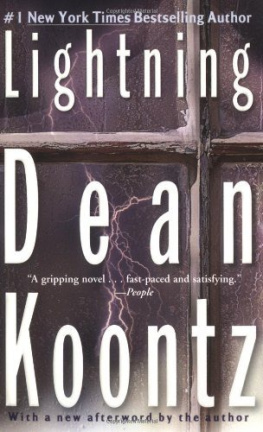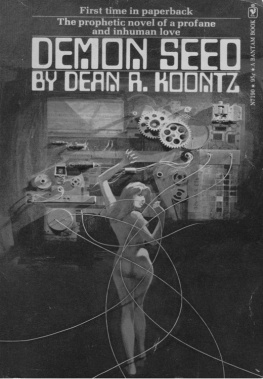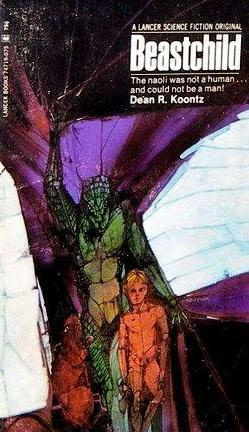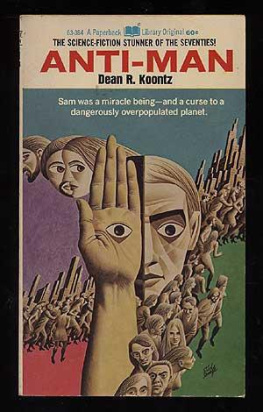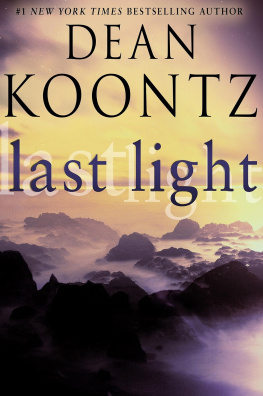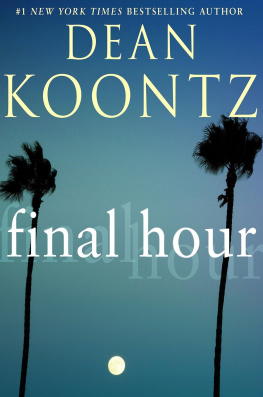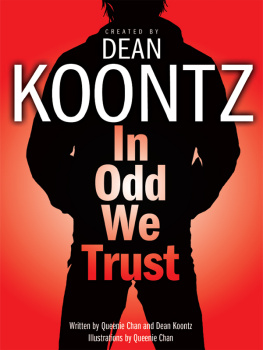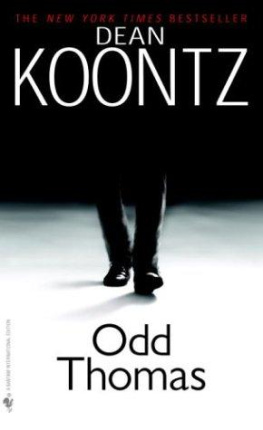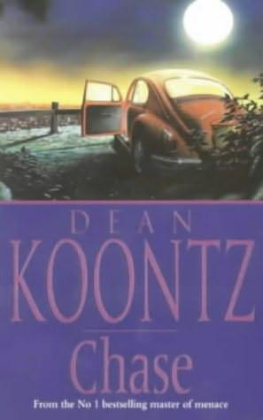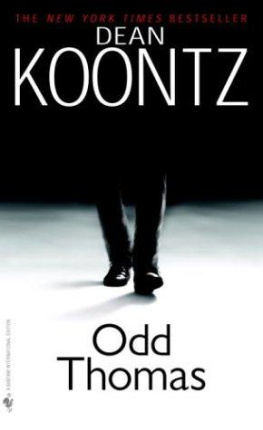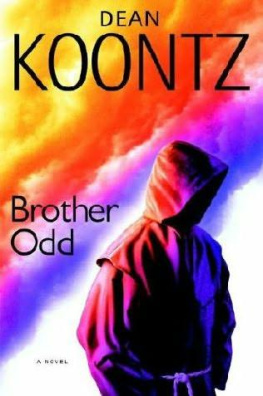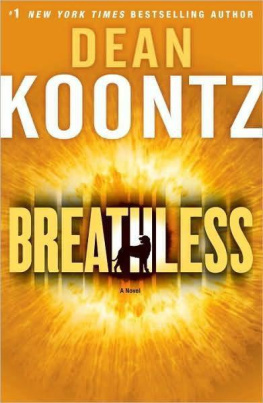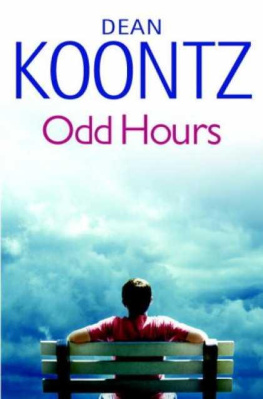Dean R. Koontz - Lightning
Here you can read online Dean R. Koontz - Lightning full text of the book (entire story) in english for free. Download pdf and epub, get meaning, cover and reviews about this ebook. year: 2003, publisher: Berkley Books, genre: Detective and thriller. Description of the work, (preface) as well as reviews are available. Best literature library LitArk.com created for fans of good reading and offers a wide selection of genres:
Romance novel
Science fiction
Adventure
Detective
Science
History
Home and family
Prose
Art
Politics
Computer
Non-fiction
Religion
Business
Children
Humor
Choose a favorite category and find really read worthwhile books. Enjoy immersion in the world of imagination, feel the emotions of the characters or learn something new for yourself, make an fascinating discovery.
- Book:Lightning
- Author:
- Publisher:Berkley Books
- Genre:
- Year:2003
- Rating:3 / 5
- Favourites:Add to favourites
- Your mark:
- 60
- 1
- 2
- 3
- 4
- 5
Lightning: summary, description and annotation
We offer to read an annotation, description, summary or preface (depends on what the author of the book "Lightning" wrote himself). If you haven't found the necessary information about the book — write in the comments, we will try to find it.
Lightning — read online for free the complete book (whole text) full work
Below is the text of the book, divided by pages. System saving the place of the last page read, allows you to conveniently read the book "Lightning" online for free, without having to search again every time where you left off. Put a bookmark, and you can go to the page where you finished reading at any time.
Font size:
Interval:
Bookmark:
Lightning
By: Dean Koontz
A CANDLE IN THE WIND
A storm struck on the night Laura Shane was born, and there was a strangeness about the weather that people would remember for years.
Wednesday, January 12, 1955, was frigid, gray, and somber. At twilight thick, fluffy snowflakes spiraled out of the low sky, and the people of Denver huddled in expectation of a Rocky Mountain blizzard. By ten o'clock that night, a bitterly cold gale blew in from the west, howling out of the mountain passes and shrieking down those rugged, wooded slopes. The snowflakes grew smaller, until they were as fine as sand, and they sounded as abrasive as sand, so, when the wind blew them across the windows of Dr. Paul Markwell's book-lined study.
Markwell slumped in the chair behind his desk, drinking Scotch to keep warm. The persistent chill that troubled him was not caused by a winter draft but by an internal frigidity of the mind and heart.
In the four years since his only child, Lenny, had died of polio, Markwell's drinking had gotten steadily worse. Now, though on call for emergencies at County Medical, he picked up the bottle and poured more Chivas Regal.
In the enlightened year of 1955, children were being inoculated with Dr. Jonas Salk's vaccine, and the day was near when no child would be paralyzed or die from poliomyelitis. But Lenny had been afflicted in 1951, a year before Salk tested the vaccine. The boy's respiratory muscles had been paralyzed, too, and the case had been complicated by bronchopneumonia. Lenny never had a chance.
From the mountains to the west, a low rumble echoed across the winter night, but at first Markwell thought nothing of it. He was so involved with his own enduring, bile-black grief that sometimes he was only subliminally aware of events that transpired around him.
A photograph of Lenny stood on his desk. Even after four years he was tortured by his son's smiling face. He should have put the photo away but instead left it in view because unceasing self-flagellation was his method of attempting to atone for his guilt.
None of Paul Markwell's colleagues was aware of his drinking problem. He never appeared to be drunk. The errors he made in the treatment of some patients had resulted in complications that might have arisen naturally and were not attributed to malpractice. But he knew that he had blundered, and self-loathing only induced him to drink more.
The rumbling came again. This time he recognized the thunder, but he still did not wonder about it.
The phone rang. The Scotch had left him numb and slow to react, so he did not pick up the receiver until the third ring. Hello?
Dr. Markwell? Henry Yamatta. Yamatta, an intern at County Medical, sounded nervous. One of your patients, Janet Shane, was just brought in by her husband. She's in labor. Fact is, they were delayed by the storm, so she was well along when they got here.
Markwell drank Scotch while he listened. Then, pleased to hear that his voice was not slurred, he asked, She still in first stage?
Yes, but her labor pains are intense and unusually protracted for this point in the process. There's blood-tinged vaginal mucus
That's to be expected.
Impatiently Yamatta said, No, no. This isn't ordinary show.
Show, or blood-tainted vaginal mucus, was a reliable sign that labor was impending. However Yamatta had said Mrs. Shane was already well into labor. Markwell had blundered by suggesting that the intern was reporting ordinary show.
Yamatta said, Not enough blood for hemorrhage, but something's wrong. Uterine inertia, obstruction of the pelvis, systemic disease
I'd have noticed any physiological irregularity that would've made pregnancy dangerous, Markwell said sharply. But he knew that he might not have noticed ... if he had been drunk. Dr. Carlson's on duty tonight. If something goes wrong before I get there, he
We've just had four accident victims brought in, two in bad shape. Carlson's hands are full. We need you, Dr. Markwell.
I'm on my way. Twenty minutes.
Markwell hung up, finished his Scotch, and took a peppermint lozenge from his pocket. Since becoming a heavy drinker, he always carried mints. As he unwrapped the lozenge and popped it into his mouth, he left the study and went along the hall to the foyer closet.
He was drunk, and he was going to deliver a baby, and maybe he was going to botch it, which would mean the end of his career, the destruction of his reputation, but he did not care. In fact he anticipated that catastrophe with a perverse longing.
He was pulling on his overcoat when a peal of thunder rocked the night. The house reverberated with it.
He frowned and looked at the window beside the front door. Fine, dry snow swirled against the glass, briefly hung suspended as the wind held its breath, then swirled again. On a couple of other occasions over the years, he had heard thunder in a snowstorm, though always at the beginning, always soft and far away, nothing as menacing as this.
Lightning flashed, then again. Falling snow flickered queerly in the inconstant light, and the window was briefly transformed into a mirror in which Markwell saw his own haunted face. The subsequent crash of thunder was the loudest yet.
He opened the door and peered curiously at the turbulent night. The hard-driving wind hurled snow under the porch roof, drifting it against the front wall of the house. A fresh, two- or three-inch white mantle covered the lawn, and the windward boughs of the pine trees were flocked as well.
Lightning flared bright enough to sting Markwell's eyes. The thunderclap was so tremendous that it seemed to come not only from the sky but from the ground, too, as if heaven and earth were splitting open, announcing Armageddon. Two extended, overlapping, brilliant bolts seared the darkness. On all sides eerie silhouettes leaped, writhed, throbbed. The shadows of porch railings, balusters, trees, barren shrubs, and streetlamps were so weirdly distorted by every flash that Markwell's familiar world acquired the characteristics of a Surrealistic painting: the unearthly light illuminated common objects in such a way as to give them mutant forms, altering them disturbingly.
Disoriented by the blazing sky, thunder, wind, and billowing white curtains of the storm, Markwell abruptly felt drunk for the first time that night. He wondered how much of the bizarre electrical phenomenon was real and how much was alcohol-induced hallucination. He edged cautiously across the slippery porch to the head of the steps that led to the snow-covered front walk, and he leaned against a porch post, craning his head out to look up at the light-shattered heavens.
A chain of thunderbolts made the front lawn and street appear to jump repeatedly as if that scene were a length of motion picture film stuttering in a jammed projector. All color was burned out of the night, leaving only the dazzling white of the lightning, the starless sky, the sparkling white of snow, and ink-black shuddering shadows.
As he stared in awe and fear at the freakish celestial display, another jagged crack opened in the heavens. The earth-seeking tip of the hot bolt touched an iron streetlamp only sixty feet away, and Markwell cried out in fear. At the moment of contact the night became incandescent, and the glass panes in the lamp exploded. The clap of thunder vibrated in Markwells teeth; the porch floor rattled. The cold air instantly reeked of ozone and hot iron.
Silence, stillness, and darkness returned.
Markwell had swallowed the peppermint.
Astonished neighbors appeared on their porches along the street. Or perhaps they were present throughout the tumult, and perhaps he saw them only when the comparative calm of an ordinary blizzard was restored. A few trudged through the snow to have a closer look at the stricken streetlamp, the iron crown of which appeared half melted. They called to one another and to Markwell, but he did not respond.
Font size:
Interval:
Bookmark:
Similar books «Lightning»
Look at similar books to Lightning. We have selected literature similar in name and meaning in the hope of providing readers with more options to find new, interesting, not yet read works.
Discussion, reviews of the book Lightning and just readers' own opinions. Leave your comments, write what you think about the work, its meaning or the main characters. Specify what exactly you liked and what you didn't like, and why you think so.

